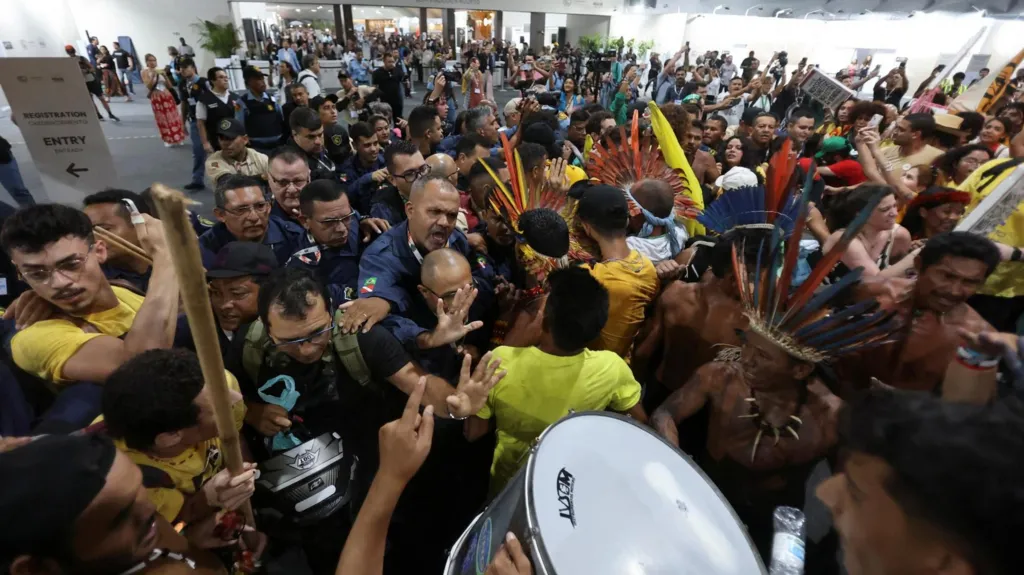
By Jeff Kapembwa
Indigenous inhabitants of the Amazon forests in Brazil ran amok, destroying property and injuring some security personnel at the opening of the annual climate indaba, the Conference of Parties (COP) 30, justifying the country’s cry over the escalating loss of an average $317 billion per year in deforestation and human induced activities.
As world leaders converged in the Amazon city of Belem during the summit running from 11-21 and themed: “Delivering on the Paris Promise,” focusing on moving from ambition to action, especially regarding climate finance, adaptation, and the implementation of national plans, protests rocked the COP 30 venue, Monday with the indigenous seeking climate action to save the world’s largest ecosystem.
Reports say, one guard had been evacuated in a wheelchair while holding his stomach.
A security guard is cited by local media as complaining against a cut he suffered above his eye after being struck with a heavy drumstick thrown from the crowd. Security confiscated several weighty sticks from the protesters.
The South American country is lobbying to ensure climate justice and equity for developing nations prevails and protect affected ecosystems.
Amid the ambitious protection of the heavily impacted amazon forests, researcher fear for the country’s natural habitation, which has been heavily affected through lost bio economic potential, fire related damages with agriculture, among other sectors losing about $422 million annually.
The World Bank’s report throws its weight to the protestors over their concern for perpetuated and unabated forest lose in which it argues that the Amazon is forest to lose up to $317 billion per year if Amazon deforestation continues at a high rate, the Bretton Woods institute says in its 2023 report.
These is potential economic losses from the depletion of natural capital, biodiversity loss, and severe social setbacks, and is seven times higher than the profits generated from commodities extracted from the rainforest.
Agriculture has been weighed down due to reduced rainfall in the aftermath of the falling of various trees leading to deforestation-resulting in a projected loss of $422 million annual loss for the agricultural sector.
Cattle Ranching remains one of the key concerns for the Amazon, making it one of the single-most-largest cause of deforestation, accounting for an estimated 80% of forest loss in some areas as land is cleared for pasture to meet global beef demand, the World Bank adds.
The Amazon rainforest had, if protected, generate a sustainable bio economy worth an estimated $8 billion per year.
There is eminent Fire-Related damage which has persisted over the years, causing an estimated damage of $10 to $80 million per year in damages to health, agriculture, and forestry.
Incensed indigenous protestors on Monday, vented their anger on delegates attending the COP 30 venue in Belem, Para State, Brazil, Monday. They overpowered security personnel, leaving some injured to demand climate justice and argued:
“We can’t eat money,” said Nato, one of the protestors, an Indigenous leader from the Tupinamba community. He argued: “We want our lands free from agribusiness, oil exploration, illegal miners and illegal loggers.”
A spokesperson from the UN, which is responsible for security inside the venue, said in a statement that “a group of protesters breached security barriers at the main entrance to the COP, causing minor injuries to two security staff, and minor damage to the venue”.
The protest came as Brazilian President Luiz Inácio Lula da Silva has highlighted Indigenous communities as key players in this year’s COP30 negotiations, even as several industries continue to further encroach on the Amazon rainforest during his presidency.
Lula told a leaders summit last week that participants at the COP30 would be “inspired by Indigenous peoples and traditional communities – for whom sustainability has always been synonymous with their way of life”.
However, Indigenous participants taking part in rolling protests in and around the climate change meeting say that more needs to be done, both by Lula’s left-leaning government at home and around the world.
A joint statement ahead of the summit from Indigenous Peoples of the Amazon Basin and all Biomes of Brazil emphasised the importance of protecting Indigenous territories in the Amazon.
As “a carbon sink of approximately 340 million tons” of carbon dioxide, the world’s largest rainforest, “represents one of the most effective mitigation and adaptation strategies”, the statement said.
Meanwhile, Zambia’s embassy in Brazil reaffirmed the country’s commitment to high-integrity global carbon markets, it said in a statement issued by the Southern African country’s green economy and environment minister, Mike Mposha.
He announced the country’s full endorsement and membership in the Coalition on Growing Carbon Markets (CGCM) during a COP30 high-level event held at the Singapore Pavilion in Belém, Brazil.
Zambia views the high-integrity carbon market as a pivotal catalyst for mobilizing climate finance, accelerating the delivery of the country’s Nationally Determined Contribution (NDC) targets, and unlocking inclusive green growth.
“Zambia is proud to endorse the Shared Principles for High-Integrity Carbon Credit Use and to join this progressive Coalition,” Minister Mposha stated, arguing:
“We strongly believe that a well-functioning market makes a significant contribution in raising climate ambition and is an important source of innovative financing that spurs economic growth.
Zambia’s National Carbon Market Framework, has now been converted into robust legislation and regulations.
The enabling policy environment provides a predictable and transparent process, positioning the country to attract private investment into high-impact mitigation projects that benefit both people and the planet.
